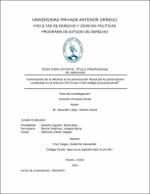Mostrar el registro sencillo del ítem
Vulneración de la eficacia en la persecución fiscal por la prescripción contenida en el artículo 334 inciso 6 del código procesal penal
| dc.contributor.advisor | Cruz Vegas, Guillermo Alexander | |
| dc.contributor.author | Alvarado López, Nelson David | |
| dc.creator | Alvarado López, Nelson David | |
| dc.date.accessioned | 2024-04-18T17:17:26Z | |
| dc.date.available | 2024-04-18T17:17:26Z | |
| dc.date.issued | 2024 | |
| dc.identifier.uri | https://hdl.handle.net/20.500.12759/26911 | |
| dc.description.abstract | Desde el punto de vista procesal, con la entrada en vigencia del Nuevo Código Procesal Penal y la notoria separación de funciones entre el ente persecutor y quien se encargue de la tarea de juzgar, es que se divide el proceso penal en tres grandes fases; siendo la “investigación preparatoria”- la primera de ellas - encargada al Ministerio Público. En esta fase del proceso penal, el Ministerio Público puede decidir, luego de una rápida diligencia preliminares, determinar la promoción de la acción penal vía: un proceso inmediato, la acusación directa o formalizando la investigación preparatoria. En el caso que decidan no promover la acción penal entonces emitirá una disposición archivando las actuaciones fiscales, es en ese contexto que, cobra relevancia la necesidad de que legislativamente se determine que, cuando ello suceda el agraviado o el denunciante, puedan interponer el recurso de la evasión de actuados para que este sea concedido y elevado al fiscal superior y que cuando este resuelva favorablemente, deba ordenar que la promoción de la acción penal o la continuación de la investigación la realice un fiscal distinto al que se decantó por el planteamiento del archivo. Lo dicho permitiría una correcta y eficaz persecución penal, habida cuenta que quien archivo las actuaciones ya no considera que el proceso debe continuar, ello se verifica muy fácilmente en la etapa intermedia en el caso del sobreseimiento fiscal y la elevación judicial de las actuaciones al fiscal superior quien ordenará -en el caso que así fuera- que otro fiscal acuse. Es así que varios países que se analizaron durante la investigación, regulan - aunque a través del juez- que la promoción de la acción penal esté en manos de un fiscal distinto al que decidió archivar | es_PE |
| dc.description.abstract | From the procedural point of view, with the entry into force of the New Criminal Procedure Code and the notorious separation of functions between the prosecuting entity and whoever is in charge of the task of judging, the criminal process is divided into three large phases; the “preparatory investigation” - the first of them - being entrusted to the Public Ministry. In this phase of the criminal process, the Public Ministry can decide, after a quick preliminary diligence, to determine the promotion of criminal action via: an immediate process, direct accusation or formalizing the preparatory investigation. In the event that they decide not to promote criminal action, then a provision will be issued archiving the tax proceedings. It is in this context that the need to legislatively determine that, when this happens, the aggrieved party or the complainant can file the appeal for judicial review becomes relevant. the evasion of proceedings so that this is granted and elevated to the superior prosecutor and that when he resolves favorably, he must order that the promotion of the criminal action or the continuation of the investigation be carried out by a prosecutor other than the one who opted for the file approach. What has been said would allow a correct and effective criminal prosecution, given that whoever filed the proceedings no longer considers that the process should continue, this is very easily verified in the intermediate stage in the case of the prosecutor's dismissal and the judicial elevation of the proceedings to the prosecutor. superior who will order - in the event that this is the case - that another prosecutor accuses. Thus, several countries that were analyzed during the investigation regulate -although through the judge- that the promotion of criminal action is in the hands of a prosecutor other than the one who decided to file | es_PE |
| dc.description.uri | Tesis | es_PE |
| dc.format | application/pdf | es_PE |
| dc.language.iso | spa | es_PE |
| dc.publisher | Universidad Privada Antenor Orrego | es_PE |
| dc.relation.ispartofseries | T_DERP_048 | |
| dc.rights | info:eu-repo/semantics/openAccess | es_PE |
| dc.rights.uri | https://creativecommons.org/licenses/by/4.0/ | es_PE |
| dc.source | Universidad Privada Antenor Orrego | es_PE |
| dc.source | Repositorio Institucional - UPAO | es_PE |
| dc.subject | Proceso Penal | es_PE |
| dc.subject | Archivo Fiscal | es_PE |
| dc.title | Vulneración de la eficacia en la persecución fiscal por la prescripción contenida en el artículo 334 inciso 6 del código procesal penal | es_PE |
| dc.type | info:eu-repo/semantics/bachelorThesis | es_PE |
| thesis.degree.level | Título Profesional | es_PE |
| thesis.degree.grantor | Universidad Privada Antenor Orrego. Facultad de Derecho y Ciencias Politicas | es_PE |
| thesis.degree.name | Abogado | es_PE |
| thesis.degree.discipline | Derecho | es_PE |
| dc.subject.ocde | https://purl.org/pe-repo/ocde/ford#5.05.00 | es_PE |
| renati.advisor.orcid | https://orcid.org/0000-0002-9119-5397 | es_PE |
| renati.author.dni | 73501605 | |
| renati.advisor.dni | 43414679 | |
| renati.type | https://purl.org/pe-repo/renati/type#tesis | es_PE |
| renati.level | https://purl.org/pe-repo/renati/level#tituloProfesional | es_PE |
| renati.discipline | 421016 | es_PE |
| renati.juror | Ortecho Aguirre, Roció Belu. | |
| renati.juror | Rincón Martínez, Angela María | |
| renati.juror | Albornoz Verde, Miguel | |
| dc.publisher.country | PE | es_PE |
Ficheros en el ítem
Este ítem aparece en la(s) siguiente(s) colección(es)
-
Derecho [481]




